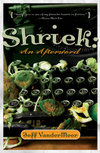
A WORD OF WARNING: Some of you may remember my hazardous enthusiasm for Geoff Ryman’s Air. This is going to be similar.
A SECOND WORD OF WARNING: This is going to be composed of fragmented responses. I’ve been having difficulty figuring out exactly how to write about this book; I think it will be more understandable if I don’t try to be too cohesive about it. What’s a blog for, after all?
THE LAST WORD OF WARNING: It’s been several weeks now since I read the book, but I keep coming back and worrying certain parts of it again and again. I’m confident that I remember it well enough to be accurate here, but it’d be kind of fitting to get it a little wrong at times. I’ll do my best not to anyway. Oh, and I have a(nother) head cold.
I’ll say up front that if you’re going to read one new fantasy novel this year, I suggest making it Jeff VanderMeer’s Shriek: An Afterword. If you’re worried about not having read other works set in the city of Ambergris (it’s a world, though, isn’t it? like all the best cities), don’t be. This book serves as a fine introduction to environs Ambergrisian.
I was throroughly sucked in right from the opening page, which is as easy and interesting a way to give you the premise of the novel as any:
A NOTE FROM THE AUTHOR
The following is my account of the life of noted historian Duncan Shriek. This text was originally begun as a belated afterword to Duncan Shriek’s The Hoegbotton Guide to the Early History of Ambergris, but circumstances have changed since I began the book.
Having begun this account as an afterword, ended it as a dirge, and made of it a fevered family chronicle in the middle, all I can say now, as the time to write comes to an end, is that I did the best I could, and am gone. Nothing in this city we call Ambergris lasts for long.
As for Mary Sabon, I leave this account for her as much as for anyone. Perhaps even now, as late as it has become, reading my words will change you.
Goodbye.
– Janice Shriek
[When I found this manuscript, I contemplated destroying the entire thing, but, in the end, I didn’t have the will or the heart to do so. And I found I really didn’t want to. It is flawed and partisan and often crude, but it is, ultimately, honest. I hope Janice will forgive or forget my own efforts to correct the record. – Duncan]
As indicated in this opening note (and the note upon it), the novel is told primarily by Janice, documenting not only her brother’s rise, fall, and persistent obsession with the gray caps–the curious, fungal, below-city dwellers at the heart of so much of the novel’s action–but the mysteries of Ambergris leading up to and through a war in which bombs are organic and motivations are constantly shifting.
It is a version of Duncan’s life, a version of Janice’s, a family history, a sideways city history, and, also, something more. Through the interplay of Janice’s telling of events and Duncan’s agreement, disagreement, and commentary we can build a narrative of combination, of subtext and supertext. Though we still don’t quite have the answers, and maybe because we don’t, the story is immensely sastisfying and surprisingly touching.
And like that, I’m having trouble coming up with a more elegant way of saying that the book as a whole does the same thing. It: is beautifully written (not a word or a line feels out of place); nonlinear and yet compellingly plotted; has just the right amount of the grotesque and the wonderful; is funny as hell at times; creates a rich world with a life of its own; and has darkness but somehow transcends it. The novel adds up to more than the sum of its parts. Which is why I hate putting it this way, but see aforementioned head cold.
I love how the book is packaged as a fragment of a secret world, a secret history of a secret world (which contains yet more secrets)–I’m a sucker for that kind of thing. Peel back the jacket and there’s a Hoegbotton and Sons logo raised above the green under-cover. I want to tell you more, but I don’t want to, because this isn’t the sort of book I want to spoil even the tiniest thing about. Okay, well one, just for an example.
One of the most resonant and evocative events in Ambergrisian history is the Silence. It casts an early shadow over Duncan’s excursions in search of the gray caps and a sinister one over the city’s future. Here’s Janice’s description of it:
More than two hundred years before, twenty-five thousand people had disappeared from the city, almost the entire population, while many thousands had been away, sailing down the River Moth to join in the annual hunt for fish and freshwater squid. The fishermen, including the city’s ruler, had returned to find Ambergris deserted. To this day, no one knows what happened to those twenty-five thousand souls, but for any inhabitant of Ambergris, the rumor soon seeps through–in the mottling of fungi on a window, in the dripping of green water, in the little red flags they use as their calling cards–that the gray caps were responsible. Because, after all, we had slaughtered so many of them and driven the rest underground. Surely this was their revenge?
I think you can see from this small section that, while fantastic, the politics of Ambergris behave recognizably, and, as such, fungal bombs or no, there is something valuable being said about the way wars happen, and about how they affect cities and civilians. About how and why nations and peoples indulge in such treachery. And how incomprehensible such things really are–you can spend a lifetime (Duncan), but you still won’t know why. You may know all sorts of things, but why seems an impossibility.
When I said this was a fantasy novel at the very beginning? It is. It’s also very much a literary novel, and that means discerning readers of all stripes should consider giving it a shot. I’d especially recommend it to fans of Borges (who gets a shout out with the Borges Bookstore) and Jeanette Winterson (think The Passion, dense, lyrical) and, of course, China Mieville (cage match!).
One puzzling thing. I’ve seen (what feels like) several reviews–including a starred one from PW–that use some variation on "difficult" to describe Shriek. Complex? Yes. Difficult? This is the kind of off-putting word that implies a book is work to read; nothing could be further from the truth here. I found the story on a page by page level absolutely engaging and a pleasure to read.
I wish I could have delved more, analyzed more, swirled more here, but I’ll leave that to the book. I have a head cold, after all, and am, as always, sans net. Read it. Because:
Then we can talk about it! Like how I was left with such a deep affection for Janice and Duncan, lovable screw-ups both (why aren’t there more characters that are just unbelievable screw-ups and likable anyway?). About our theories on what the gray caps secret revenge plans actually are. I tell Emma the Dog and Christopher the Rowe that the "Gray caps will get you!" when they sniff around off-limits places now. So if you’ve already read Shriek, feel free to post in the comments: I want to talk about this one!
See also:
Jeff VanderMeer’s blog
Shriek the Novel site
Shriek the Movie site
On the Bat Segundo Show
Audio and commentary at the Agony Column

